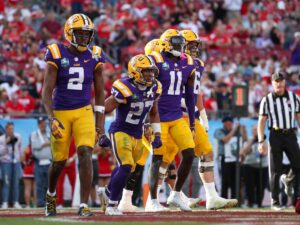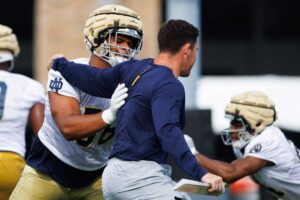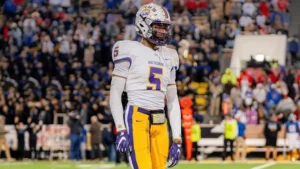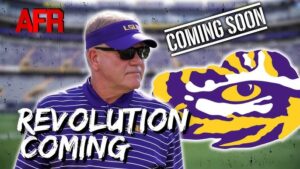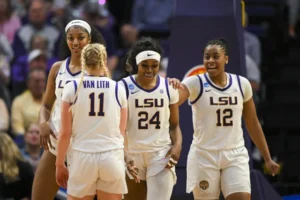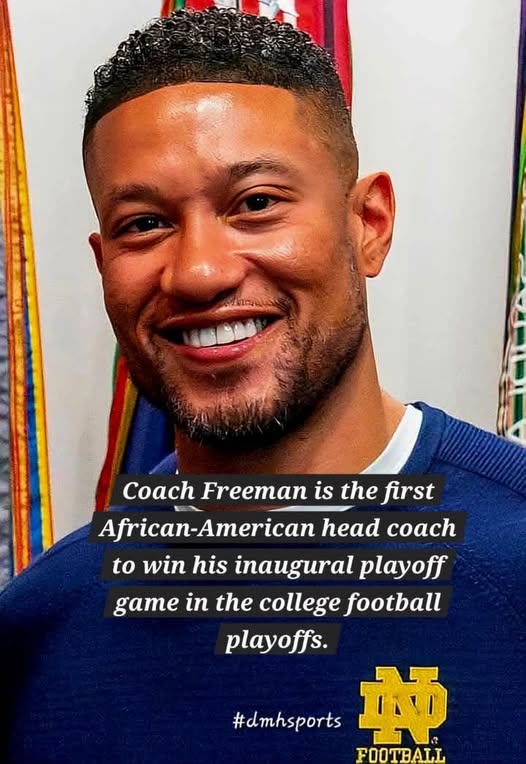
Marcus Freeman, Notre Dame football coach which happens to be the first African-American Coach to Win Awards
Marcus Freeman’s journey from a promising linebacker to a trailblazing head coach at Notre Dame is a testament to resilience, dedication, and the relentless pursuit of excellence. In just his third season, Freeman not only led the Fighting Irish to the College Football Playoff National Championship but also became the first Black and Asian American head coach to achieve this feat. His accomplishments have redefined the landscape of college football coaching and inspired countless individuals worldwide.SBNation.com+1fightingirish.com+1
Early Life and Playing Career
Born on January 10, 1986, in Dayton, Ohio, Marcus Freeman was raised in a family that valued discipline, hard work, and community. His athletic prowess became evident during his high school years at Wayne High School, where he was recognized as one of the top linebackers in the state. Freeman’s talent earned him a scholarship to The Ohio State University, a powerhouse in college football.
At Ohio State, Freeman’s impact on the field was immediate. He played under renowned coaches and alongside future NFL stars, honing his skills and understanding of the game. His leadership qualities were apparent, and he quickly became a cornerstone of the Buckeyes’ defense. Freeman’s tenure at Ohio State set the stage for his future coaching career, providing him with invaluable experiences and insights into the intricacies of football at the highest level.
Transition to Coaching
After his playing career, Freeman transitioned into coaching, starting as a graduate assistant at Kent State University. His work ethic and football IQ did not go unnoticed. He soon moved on to coaching positions at Purdue University, the University of Cincinnati, and the University of Notre Dame. Each stop allowed Freeman to refine his coaching philosophy and build relationships that would later prove instrumental in his head coaching journey.
In 2021, Freeman was appointed as the defensive coordinator at Notre Dame. His aggressive defensive schemes and ability to develop players quickly garnered national attention. Under his leadership, the Fighting Irish’s defense became one of the most formidable units in college football. Freeman’s emphasis on discipline, preparation, and adaptability resonated with his players, leading to a series of successful seasons.
Historic Appointment as Head Coach
In December 2021, following the departure of Brian Kelly, Notre Dame appointed Marcus Freeman as its 30th head football coach. This decision was groundbreaking, as Freeman became the first Black head coach in the program’s storied history. His appointment was met with widespread acclaim, with many viewing it as a significant step toward greater diversity and inclusion in college football coaching ranks.SBNation.com
Freeman’s leadership style is characterized by transparency, empathy, and a commitment to player development both on and off the field. He emphasizes the importance of education, community service, and personal growth, fostering an environment where student-athletes can thrive holistically. His approach has not only elevated the Notre Dame football program but has also set a new standard for coaching excellence.
2024 Season: A Historic Run
The 2024 season was a defining moment in Freeman’s coaching career. After a challenging early loss to Northern Illinois, the Fighting Irish rallied under Freeman’s guidance, winning 11 consecutive games. Their remarkable turnaround culminated in a thrilling 27–24 victory over Penn State in the College Football Playoff semifinal, propelling Notre Dame into the National Championship game against either Ohio State or Texas .Fighting Irish WiretalkSPORT+1Reuters+1
This achievement was historic on multiple fronts. Freeman became the first Black and Asian American head coach to lead a team to the College Football Playoff National Championship . His success underscored the importance of diversity in leadership positions and highlighted the potential for underrepresented groups to excel at the highest levels of college athletics.collegefootballireland.com+8San Francisco Chronicle+8SBNation.com+8People.com+2SBNation.com+2fightingirish.com+2
Awards and Recognition
Freeman’s exceptional leadership and coaching acumen were recognized through several prestigious awards during the 2024 season:
-
Paul “Bear” Bryant Coach of the Year Award: Presented annually to the nation’s top college football coach, Freeman’s receipt of this honor reflected his outstanding performance and impact on the sport .
-
Dodd Trophy: Awarded to the coach whose program excels on the field, in the classroom, and in the community, Freeman’s holistic approach to coaching was acknowledged through this accolade .Wikipedia+1Fighting Irish Wire+1
-
George Munger College Coach of the Year Award: This award recognized Freeman’s excellence in coaching and his significant contributions to the game of college football .Wikipedia
-
Allstate AFCA Good Works Team Honorary Head Coach: Freeman’s commitment to community service was highlighted by his selection as the honorary head coach for this esteemed team .SI
These accolades not only celebrated Freeman’s coaching prowess but also underscored his dedication to the values of integrity, leadership, and service.
Cultural Impact and Legacy
Marcus Freeman’s ascent to the pinnacle of college football coaching carries profound cultural significance. As the first Black and Asian American head coach to lead a team to the College Football Playoff National Championship, Freeman’s success challenges longstanding racial and ethnic barriers in the sport . His journey serves as an inspiration to aspiring coaches from diverse backgrounds, illustrating that talent, determination, and character can transcend systemic obstacles.
Beyond his on-field achievements, Freeman’s emphasis on community engagement and player development reflects a broader vision for the role of college athletics in shaping young lives. His leadership philosophy prioritizes education, personal growth, and societal contribution, setting a new benchmark for what it means to be a coach in the modern era.
